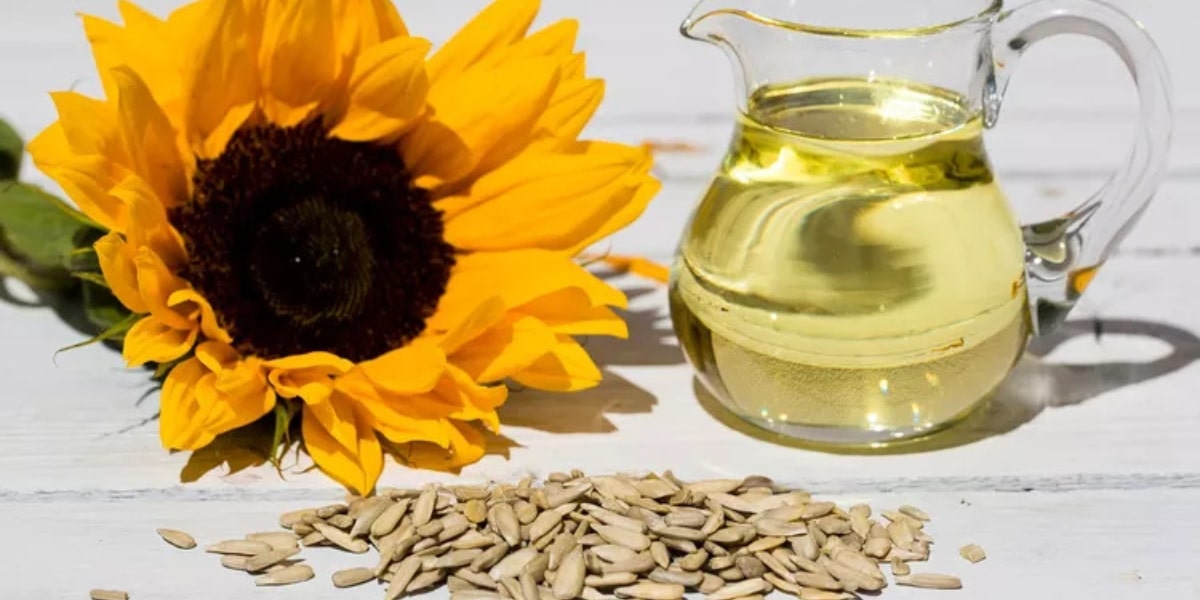Blog
Sunflower Oil Benefits: Why It’s Essential for You?

With so many options at the grocery store, it can be hard to know which oil to choose. You may already know that olive oil and avocado oil are two healthy options. But you don’t always hear about sunflower oil. Here, we’ll break down what it is, give you nutrition information and health benefits, and help you figure out if you should include it in your diet.
Sunflowers don’t just look good on your dining table; their oil has become a kitchen counter staple. These iconic flowers produce an oil highly regarded for unsaturated fats and heart health benefits. When used in moderation, sunflower oil boasts several major benefits for your skin, hair, heart, and more.
What Is Sunflower Oil?
Sunflower oil is high in either linoleic or oleic acid, these oils include high linoleic, mid-oleic, high oleic and high stearic/oleic acid. The two acids contain high sources of energy and promote tissue strength. All sunflower oils contain vitamin E and are 100% fat.
Sunflower oil is made from pressing the seeds of the sunflower plant and is high in heart-healthy poly- and monounsaturated fats. “There are four main varieties of sunflower oil used in foods and for cooking; they differ in their balance of polyunsaturated and monounsaturated fats. High-linoleic sunflower oil is highest in omega-6 polyunsaturated fatty acids, while mid-oleic and high-oleic sunflower oils have more monounsaturated fats,” says Ali Webster, Ph.D., RD, director of research and nutrition communications at the International Food Information Council.
Sunflower oil nutrition
Serving size: 1 tablespoon
Calories: 120
Total fat: 14 g
Saturated fat: 1 g
Monounsaturated fat: 3 g
Polyunsaturated fat: 9 g
Total carbohydrate: 0 g
Dietary fiber: 0 g
Sugar: 0 g
Choline: 0.03 mg
Vitamin E: 5.59 mg
Vitamin K: 0.73 mcg
How to Use Sunflower Oil in Cooking?
Sunflower seed oil is a versatile cooking oil that can be easily incorporated into your daily meals. Here’s how you can make the most of the advantages of sunflower oil in your everyday cooking:
1. Frying and Sauteing:
Sunflower oil can be used to stir-fry or sauté. “Refined sunflower oil, particularly high-oleic or mid-oleic varieties, has a high smoke point (about 450°F) whether you’re making pakoras, stir-fries, or sautéed vegetables, sunflower oil holds up well to high heat, ensuring your food cooks evenly without burning the oil. It is a good neutral oil for frying and other high-heat cooking methods, like stir-frying and sautéing,” Webster says. “If you can find cold-pressed sunflower oil, which has a rich, nutty flavor, using it in salad dressings and other low-heat applications is a good way to showcase its taste.”
2. Baking:
You can use sunflower seed oil as a substitute for butter or other oils in baking. It works well in cakes, muffins, and bread, adding moisture and a light texture to your baked goods.
3. Salad Dressings:
For a lighter salad dressing, mix sunflower seed oil with vinegar, lemon juice, or herbs. Its mild flavor won’t overpower the other ingredients, making it perfect for drizzling over fresh salads.
4. Grilling:
Brush sunflower oil on meat, paneer, or vegetables before grilling to prevent sticking and add a subtle flavor. The benefits of sunflower oil are that its high smoke point makes it ideal for grilling at high temperatures.
5. Everyday Cooking:
Sunflower seed oil is excellent for everyday Indian dishes like dal, curries, and rice.
It blends well with spices, enhances the flavor of the food, and keeps your meals healthy with its unsaturated fats.
Different types of sunflower oil
There are four types of sunflower oil available in the United States, all of which are made from sunflower seeds that are bred to produce different fatty acid compositions. These include high linoleic (68% linoleic acid), mid-oleic (NuSun, 65% oleic acid), high oleic (82% oleic acid), and high stearic/high oleic (Nutrisun, 72% oleic acid, 18% stearic acid)
As their names suggest, some sunflower oils are higher in either linoleic or oleic acid. Linoleic acid, commonly known as omega-6, is a polyunsaturated fatty acid that has two double bonds in its carbon chain. Meanwhile, oleic acid, or omega-9, is a monounsaturated fatty acid with one double bond. These properties make them liquid at room temperature
Linoleic and oleic acid are both sources of energy for the body and contribute to cell and tissue strength. However, they react in different ways to heat during cooking and therefore may have varying effects on your health.
High stearic/high oleic sunflower oil (Nutrisun) also contains stearic acid, a saturated fatty acid that’s solid at room temperature and has different culinary applications.
This type of sunflower oil is not meant for home cooking and instead may be used in packaged foods, ice creams, chocolate, and industrial frying.
Is Sunflower Oil Healthy?
Sunflower oil made from sunflower seeds is packed with healthy fats like:
- Monounsaturated fats (MUFA)
- Polyunsaturated fats (PUFA)
These fats help your heart lower bad LDL cholesterol while keeping your good HDL cholesterol levels steady. Cold-pressed sunflower oil, which is extracted without using high heat, retains more of its natural nutrients.
One of the biggest advantages of sunflower oil is its role in supporting heart health. Sunflower oil has omega-6 fatty acids, which help reduce inflammation and lower triglyceride levels, which is good for the cardiovascular system.
However, make sure to balance the uses of sunflower oil, which contains omega 6, with omega 3s to avoid excess inflammation. Despite the calorie content, similar to other oils, the health benefits of sunflower oil make it a valuable addition to a balanced diet.
What Skin Type Is it Good For?
Sunflower oil is good for dry skin, sensitive skin, combination skin, oily skin, and mature skin.
- For dry skin: sunflower oil helps provide moisture and allows skin to retain water.
- For sensitive skin: sunflower oil provides gentle moisture, protection, and a soothing feel.
- For combination skin: sunflower oil helps both provide moisture and balance oils in the areas that need it.
- For oily skin: while it may seem counterintuitive to use an oil on oily skin, sunflower is non-comedogenic and doesn’t clog pores and helps to balance natural oils.
- For mature skin: sunflower oil adds hydration and minimizes the look of fine lines and wrinkles, as well as protecting against future damage.
Potential Health Benefits of Sunflower Oil
When it comes to sunflower oil, the health benefits are just as resounding as the benefits attached to olive and avocado oil. Let’s take a closer look at how sunflower oil can boost your appearance, help your heart, and relieve aching joints.
1. Improves Heart Health
High cholesterol content in the body means that one is more likely to develop atherosclerosis, high blood pressure, and increased chances of heart attack or a stroke. Sunflower oil is a good choice for keeping a healthy heart. It is rich in oleic-acid (monounsaturated fatty acid- MUFA) and has favorable outcomes on blood lipids and factor VIIc (coagulant activity). Moreover, it contains Vitamin E, which prevents dangerous free radicals from oxidizing the body’s cholesterol. Thus, sunflower seed oil can be a great ingredient to be used for cooking. A diet full of MUFA is beneficial to keep a check on atherosclerosis and many cardiovascular diseases can be prevented.
2. Improves Skin Health
Sunflower seed oil has a remarkable impact on skin. In a study it has been demonstrated that it preserves stratum corneum integrity, does not cause erythema, and improves hydration. Not only for adults, it is also of great importance for neonates as well.
The infant massage using this oil enhances skin barrier function and completely moisturizes the skin. Research also suggests that it is a better alternative than olive oil for dry skin. It is full of vitamins E, A, D, C which keeps the skin supple and works as an excellent face moisturizer with its antioxidant activity. This oil helps the skin cells to regenerate and prevent acne.
Vitamin E in sunflower oil protects against hazardous effects of UV radiation. It offers photoprotection and effectively works on wrinkles, blemishes & patchy skin.
With protective antioxidants and its ability to retain moisture, sunflower oil can help minimize the look of fine lines and wrinkles. It can also help protect your skin against further damage.
For those with sensitive or mature skin, sunflower oil is ideal as it is gentle on the skin and has calming properties.
3. Prevents Arthritis
Sunflower seed oil has been shown to have anti-inflammatory capacity. Its major lipid is linoleic acid, which possibly decreases inflammation in the skin by activating peroxisome proliferator-activated receptor-alpha (PPAR-α). It has been linked to a reduction in severity of rheumatoid arthritis when used within recommended limits.
4. Prevents Asthma
Vitamin E reduces and prevents oxygen damage to the tissue and is useful for the treatment of pain, inflammation and allergic reactions. A number of studies suggest that vitamin E reduces bronchoconstriction associated with asthma. It shows lower prevalence of wheezing, cough and shortness of breath compared to those with lower intakes. So, sunflower oil which is a rich source of Vitamin E can be a good option to prevent asthma.
5. Prevents Cancer
Sunflower seed oil is also rich in vitamin A and carotenoids. The antioxidant content helps to fight the free radicals that cause degeneration of cells and inhibits the growth of cancerous cells. Moreover, the selenium present in sunflower seeds repairs cellular damage. So, the incorporation of sunflower oil in the diet can play a major role in reducing colon cancer, and uterine cancer as well.
6. Improves Immune System
Sunflower oil provides adequate linoleic acid for maintenance of the immune response. Linoleic acid is needed for normal immune response, and essential fatty acid (EFA) deficiency impairs B and T cell-mediated responses. It helps in building new cells and tissues of the body, which is beneficial in boosting the immune system.
7. Improves Hair Health
Higher amounts of tocopherol are available in sunflower oil. The study shows that the intake of natural vitamin E may help against collagen cross-linking & thus hair health. It can treat problems of baldness & hair loss.
In addition to sunflower oil, many other oils are known for their beneficial effects on hair health. Mustard oil, for instance, has been used for centuries in traditional hair care treatments and is known to promote hair growth, prevent hair loss, and nourish the scalp.
Read more: Is Mustard Oil Good for Hair? Learn Its Top 7 Benefits
If you’re looking for a natural remedy for stronger, healthier hair, mustard oil may be just what you need. Here’s how it can benefit your hair and scalp.
8. Improves Digestion
Sunflower seed oil contains high content of polyunsaturated fatty acids (PUFA). PUFA are found to increase digestibility thus, healthy digestion.
9. Helps Aid Weight Loss
Adiponectin is basically involved in the fatty acid breakdown. According to a study, sunflower oil increases adiponectin levels in postmenopausal women thus, reducing weight.
10. Reduces Depression & Anxiety
It contains magnesium which has been found to work in mood disorders like depression & anxiety. Magnesium ions regulate calcium ion flow in neuronal calcium channels that helps to regulate neuronal nitric oxide production. Thus, it treats the associated symptoms.
11. Acne Treatment
When used correctly, sunflower oil may reduce the effects of acne. Linoleic acid is extremely moisturizing and contains vitamin E, an antioxidant known for its anti-inflammatory capabilities. Sunflower seed oil is also an ideal ingredient for anti-aging products.
If you’re formulating an acne product containing sunflower oil, make sure it’s cold-pressed. Cold-pressed oils have a shorter shelf life, but cooking oil should never be used on the skin.
12. Joints, Respiratory Health, & More
Beyond its healthy heart and skin benefits, sunflower seed oil is known to help with arthritis, respiratory issues, digestive problems, and even brain health. The anti-inflammatory properties of sunflower oil could provide relief for achy joints as well as alleviate common asthma symptoms.
Is Sunflower Oil Keto-Friendly? Here’s What You Need to Know
Sunflower oil is indeed keto-friendly and can be a valuable addition to your ketogenic diet.
The keto diet focuses on high-fat, low-carbohydrate consumption to achieve and maintain ketosis and sunflower oil fits well into this framework.
Why Sunflower Oil is Keto-Friendly
Sunflower oil is primarily composed of fats, with a significant portion being polyunsaturated fats, especially omega-6 fatty acids. Since the keto diet requires consuming more fats and very few carbs, sunflower oil’s macronutrient profile makes it a suitable cooking oil for keto enthusiasts. Importantly, sunflower oil contains no carbohydrates, so it won’t interfere with your carb limits on the keto diet.
High Smoke Point for Versatility
Another reason sunflower oil works well on a keto diet is its relatively high smoke point—around 440°F (227°C). This makes it ideal for a variety of cooking methods such as frying, sautéing, and baking. The high smoke point ensures that the oil remains stable at high temperatures without breaking down into harmful compounds, which is crucial for maintaining the health benefits of the oil while cooking.
Omega-6 Fatty Acids Considerations
While sunflower oil provides healthy fats, it’s important to note that it’s particularly high in omega-6 fatty acids. While omega-6s are essential fats, they can promote inflammation in the body if consumed in excess and without a balance of omega-3 fatty acids. Therefore, while sunflower oil can be used on a keto diet, it’s advisable to balance it with other sources of omega-3s, such as fatty fish (like salmon), flaxseeds, or chia seeds, to maintain a healthy omega-3 to omega-6 ratio.
Sunflower Oil vs Other Oils on Keto
While sunflower oil is keto-friendly, there are other oils that may provide additional health benefits. For example, coconut oil and avocado oil are also high in healthy fats, particularly medium-chain triglycerides (MCTs) and monounsaturated fats, which are considered more beneficial for maintaining ketosis. That said, sunflower oil can still be part of a balanced ketogenic diet, especially if used in moderation and combined with other healthy fats.
Negative effects
Despite some evidence suggesting that sunflower oil offers health benefits, there’s concern that it may be linked to negative health outcomes.
High omega-6 content
Varieties of sunflower oil that are not high oleic contain more linoleic acid, also known as omega-6. Mid-oleic (NuSun) sunflower oil, one of the most commonly used varieties in the United States, comprises 15–35% linoleic acid.
Even though omega-6 is an essential fatty acid that humans need to obtain from their diet, there are concerns that consuming too much of it can lead to inflammation in the body and related health issues . This is because linoleic acid is converted into arachidonic acid, which can produce inflammatory compounds
The overconsumption of linoleic acid from vegetable oils coupled with a decreased intake of anti-inflammatory omega-3 fatty acids — an imbalance commonly seen in the American diet — may lead to negative health effects. In particular, animal studies suggest that the arachidonic acid produced from omega-6 in the body may increase inflammatory markers and signal compounds that promote weight gain and obesity.
Oxidation and aldehydes
Another negative aspect of sunflower oil is its release of potentially toxic compounds upon being heated to temperatures of 356°F (180°C) repeatedly, such as in deep-frying applications. Sunflower oil is often used in high heat cooking, as it has a high smoke point, which is the temperature at which it starts to smoke and break down. However, studies show that a high smoke point does not correspond with an oil’s stability under heat.
One study found that sunflower oil released the highest amount of aldehydes into cooking fumes, compared with other plant-based oils in three types of frying techniques. Aldehydes are toxic compounds that can damage DNA and cells and thus contribute to conditions like heart disease and Alzheimer’s. The longer that sunflower oil is exposed to heat, the more aldehydes it emits. Therefore, gentle, low heat cooking methods such as stir-frying may be a safer use of sunflower oil.
What’s more, of the different types, high oleic sunflower oil is likely the most stable variety when used in high heat frying and cooking.
Conclusion:
Sunflower oil is a versatile and healthful cooking oil that offers a variety of benefits for both your body and skin. With its high content of unsaturated fats, particularly monounsaturated (oleic acid) and polyunsaturated fats (linoleic acid), it supports heart health, helps lower bad cholesterol, and contributes to overall well-being. The oil is also rich in antioxidants, including vitamin E, which provides protective effects for both your skin and internal systems.
In addition to its cardiovascular and skin benefits, sunflower oil is an excellent choice for cooking due to its high smoke point, making it suitable for high-heat applications such as frying, sautéing, and grilling. Whether used for cooking or as a natural skincare remedy, sunflower oil’s mild, neutral taste and light texture make it easy to incorporate into your daily routine.
However, like all oils, it’s important to use sunflower oil in moderation and balance it with other healthy fats, such as omega-3s, to prevent the potential negative effects of an imbalanced omega-6 to omega-3 ratio. Opting for cold-pressed or high-oleic sunflower oil can further enhance its nutritional benefits, especially for heart health.
When choosing sunflower oil for its skin benefits, organic, cold-pressed varieties are ideal as they preserve the most nutrients and antioxidants. Whether you use it for cooking, moisturizing, or improving hair and skin health, sunflower oil is a valuable addition to any healthy lifestyle.
Always remember, before making significant dietary or skincare changes, it’s best to consult with a healthcare professional to ensure sunflower oil is a good fit for your individual needs. By using it responsibly, sunflower oil can offer long-lasting health benefits for your body, skin, and overall wellness.
Does sunflower oil affect the taste of food?
Sunflower seed oil has a light and neutral taste, so it doesn’t overpower the flavor of your food.
Can sunflower oil be mixed with other oils for cooking?
Yes, sunflower seed oil can be mixed with other oils like olive oil or sesame oil for cooking. This can enhance the flavor of your dishes and provide a balance of different nutrients.
How does sunflower oil handle reheating?
Sunflower seed oil is stable under heat, making it a good choice for reheating food. However, like all oils, repeated reheating should be avoided to prevent the formation of harmful compounds.
Does sunflower oil require refrigeration?
No, sunflower seed oil doesn’t require refrigeration. It should be stored in a cool, dark place, away from direct sunlight, to maintain its freshness and quality.
Does sunflower oil go bad?
Yes, like all oils sunflower seed oil can go bad over time. To prolong its shelf life, store it in a cool, dark place and use it within six months of opening. Cold-pressed sunflower seed oil may have a shorter shelf life due to its minimal processing.
Is sunflower oil bad for your skin?
No, the benefits of sunflower oil for skin are numerous. It can help fight signs of aging, moisturize, soothe temporary redness and provide antioxidant support.
Which sunflower oil is best for skin?
Organic, cold-pressed (or expeller pressed) sunflower oil is best for skin. Avoid sunflower oil that’s been chemically processed.
Can I use sunflower oil as a moisturizer?
Yes, you can use sunflower oil as a moisturizer. Simply apply a few drops to your clean face and allow it to absorb.
Can you use sunflower oil on your face?
Yes, you can use sunflower oil on your face as a moisturizer or pre-cleanser/makeup remover. As a moisturizer, simply apply to clean skin and allow it to absorb. To pre-cleanse, apply the oil all over your face, then wipe clean with a damp cloth. Follow up with your favorite face wash.
What does sunflower oil do for your skin?
Sunflower oil is no less than a miracle ingredient! It is able to hydrate, unclog pores, minimize signs of aging, and even out skin tone. It’s also full of antioxidants like vitamin E, vitamin A, vitamin C, vitamin K, and vitamin D, which means sunflower oil can protect your skin from environmental stressors that threaten to harm it. It also minimizes the appearance of signs of aging while soothing the skin.
Sunflower oil vs safflower oil?
Sunflower oil and safflower oil come from two different but related plants. Sunflower oil comes from the yellow blooms known as sunflowers, while safflower oil comes from a similar plant with yellow and orange petals.



